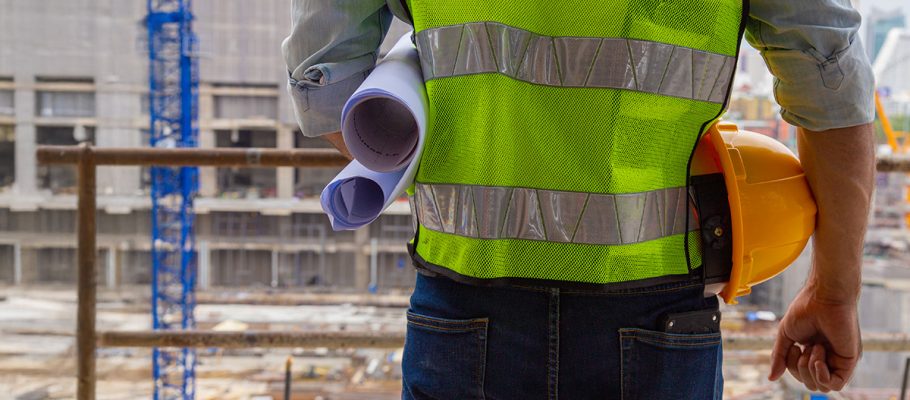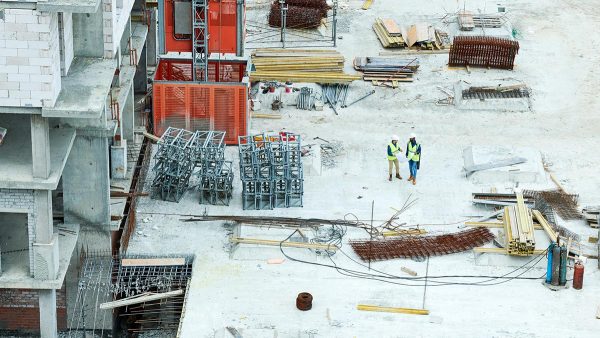
Starting a commercial construction project, whether you’re updating your current space or building something entirely new, can feel overwhelming. If you are considering hiring a construction manager and would like to better understand the role, this guide provides real-world examples to explain the impact and importance of hiring the right construction project manager for your next commercial project.
Construction project management is all about keeping your project on track: on schedule, within budget, and up to quality standards. From the first planning stages to the final touches, a skilled construction manager helps everything function smoothly and efficiently.
This article will walk you through what construction management really involves. It will explain what construction managers do, the skills they bring to the table, and how they guide a project from start to finish. Whether you’re new to the process or just need a refresher, this guide will give you a clear picture of how important construction management is to ensure your project’s success.
Ultimately, our goal is to provide you with a comprehensive understanding of the various aspects of construction management so that you can make informed decisions when hiring a construction management company for your next business project.
Looking for a reliable commercial construction manager for your next project?
At AJC, we help streamline complex builds with proven experience and hands-on leadership. Partner with Orlando’s trusted commercial construction management company and take the stress out of your next commercial project.
Call us at 407-298-1550 or fill out our contact form to schedule your complimentary consultation.
Construction Manager Definition
When you’re taking on a construction project, having the right construction manager on board can make a significant difference. But what exactly does a construction manager do?
A construction manager, sometimes called a construction project manager, is the person or firm responsible for overseeing every aspect of the project, from the initial planning stage to the final walkthrough. Their prime objective is to keep everything running smoothly, on time, and within budget. Think of them as the central coordinator who brings all the moving parts together and keeps the project on track.
Construction managers wear many hats. They plan, coordinate, budget, and supervise construction work, whether it’s a small renovation or a major commercial build. Their attention to detail and skill to manage multiple teams and timelines are what ensure a successful outcome. To do this effectively, a construction manager needs a strong mix of technical knowledge, project management skills, leadership, and top-notch communication.
In short, a construction manager oversees every aspect of a project and is essential to delivering it successfully. So when you’re considering hiring a construction management firm, you’re not just bringing in someone to oversee the work; you’re hiring an expert who will take charge of the details and guide your project from concept to completion.
What Does A Project Manager Do For A Construction Company
Construction project managers play a vital role in the smooth and efficient completion of commercial construction projects. Their job is to make sure every aspect, no matter how big or small, is accounted for. Their responsibilities include:
1. Planning and Preparation
Before you even place the first shovel in the ground, you want your project fully planned to avoid headaches, so here are the tasks project managers do in the earlier stages:
Project Planning & Scheduling
For a project to be successful, a solid and detailed plan is a must. Your project manager will outline the full scope of the job: defining timelines, objectives, and key milestones. They’ll coordinate everything from design approvals to construction scheduling, setting the foundation for a smooth build.
Budget Management
Tracking and controlling project costs to make sure the build stays within budget and avoids unnecessary expenses is another major job of your construction manager.
Resource Management
If you want to stay on budget and schedule, you want your project to use resources efficiently. Your project manager will ensure labor, materials, and equipment are allocated wisely, reducing waste and keeping the project moving.
Subcontractor Selection
The quality of your subcontractors can also make or break a project. The project manager will handle the vetting, hiring, and management of all subcontractors, ensuring they meet both your standards and the project’s demands.
In states like Florida, the labor market is both competitive and seasonal, particularly during peak summer months. How do we prevent issues with subcontractors in a tight market? At AJC, we maintain long-standing relationships with vetted local subcontractors who are licensed, insured, and experienced in Florida’s building code nuances. That ensures your job site won’t stall due to contractor no-shows or failed inspections.
Cost Estimating
No one likes unexpected costs. That’s why your project manager will provide detailed cost estimates up front, factoring in everything: from materials and labor to permits and contingencies. This helps you plan financially and avoid surprises.
Construction costs are affected by unexpected material demand surges, such as those caused by a natural disaster. Here i Florida, we’ve seen prices for drywall, roofing, and concrete spike after major storms. At AJC, we monitor market conditions and factor in escalation clauses and local sourcing options to keep your budget realistic and responsive.
Risk Management
Even with all of this preparation, construction always involves a bit of unpredictability. To mitigate issues, your project manager should identify potential risks early on and put strategies in place to prevent them, so your project remains on schedule, even when challenges arise.
At our firm, we always account for disruptions during hurricane season, the impact of high humidity on material storage, and sudden inspections from environmental agencies. Our risk planning includes weather contingency buffers, alternate sourcing strategies, and daily tracking for compliance risks.
For instance, on a recent healthcare project located in Central Florida Research Park, AJC proactively secured backup suppliers to prevent delays from a tropical storm warning that temporarily shut down one of the region’s major distribution routes.
2. Execution and Oversight:
Once everything is planned out, it’s time to get to work. When your project starts, these are the areas your project manager is meant to handle:
On-Site Supervision
Once construction begins, your project manager will be regularly on-site to support the project superintendent who will be on site full time overseeing day-to-day operations and making sure the work stays aligned with plans and quality standards.
Team Leadership
Strong leadership is crucial. Your project manager will keep the team motivated and coordinated, solving conflicts and making sure everyone is working toward the same goal. Good leadership means the team works efficiently and stays focused to deliver success.
Quality Control
Delivering high-quality results is a top priority. The project manager will conduct regular quality checks to ensure every part of the build meets required specifications and expectations.
Problem Solving
Unexpected issues? They are there for that as well. Your project manager will address them quickly and efficiently, finding practical solutions that minimize delays or added costs.
Communication & Stakeholder Management
Clear, consistent communication keeps everyone aligned. Your project manager will act as the main point of contact, keeping you, subcontractors, and the team informed at every stage.
Safety Compliance
Ensuring all on-site activities follow safety regulations to protect workers and avoid legal issues.
While all states are subject to federal OSHA standards, some states have their own OSHA-approved plans with additional regulations. Here in Florida, job sites are also subject to local fire marshal inspections, high-heat advisories, and OSHA heat illness prevention protocols, especially during peak summer months. Our field teams at AJC follow strict safety protocols that meet both national and Florida-specific requirements, including hydration stations, shade setups, and job site temperature monitoring.
Contract Management
They will manage agreements with subcontractors, vendors, and suppliers to ensure terms are met and relationships run smoothly.
Permitting & Regulatory Compliance
Handling all required permits and making sure the project follows local codes, zoning laws, and other regulations is the final key aspect of your project manager’s role.
In Central Florida, permit approval timelines vary by municipality or county and can often be delayed. How do we help or clients avoid these pitfalls? By coordinating directly with city and county officials in Orange, Osceola, and Lake Counties to expedite plan reviews and catch issues before submission. For example, we’ve successfully fast-tracked permits for self-storage and religious builds in Orlando by preemptively resolving floodplain and fire access concerns during design.
Progress Reporting
We know you want to receive regular updates, including progress reports, milestone achievements, and any issues that need attention. Your project manager will make sure you have all the information you need for quick decision-making.
Need a construction manager you can trust to protect your timeline and budget?
Let AJC handle the details, so you can stay focused on your business. We specialize in managing commercial construction projects from start to finish with transparency, precision, and care. Call us today at 407-298-1550 or complete our contact form to request your free consultation.
Construction Project Manager Duties And Responsibilities
Here’s a summary of the most essential duties and responsibilities you can expect from a construction project manager:
| Topic | Duties | Responsibility |
|---|---|---|
| Planning | Project Planning, Project Scheduling, Resource Management, Cost Estimating, Risk Management | Develop the overall project roadmap, allocate resources, anticipate risks, and define timelines and milestones to ensure a smooth and strategic construction process. |
| Budgeting | Budget Management, Cost Estimating | Monitor and control expenses, forecast costs accurately, and ensure the project stays within financial limits while preparing for contingencies. |
| Procurement | Subcontractor Selection | Identify, vet, and manage subcontractors to ensure reliable execution, quality craftsmanship, and compliance with standards and deadlines. |
| Execution | On-Site Supervision, Team Leadership, Problem Solving | Oversee day-to-day operations, guide project teams, and resolve challenges efficiently to maintain momentum and build quality. |
| Quality | Quality Control | Enforce high standards through inspections and detailed oversight to ensure all work meets project specifications. |
| Communication | Communication, Stakeholder Management, Progress Reporting | Maintain consistent, clear updates with all parties involved, including clients and contractors, to keep everyone aligned and informed throughout the project lifecycle. |
| Safety | Safety Compliance | Enforce OSHA and local safety regulations to protect all personnel and meet legal and ethical obligations. |
| Legal / Admin | Contract Management, Permitting & Regulatory Compliance |
Manage contracts with subcontractors and vendors, and secure all necessary permits to ensure compliance with local laws, zoning rules, and building codes. |
If you would like an in-depth look and understand how each duty and responsibility fits into the day-to-day reality of commercial construction (with real-world Florida-specific examples), be sure to read the section above titled “What Does A Project Manager Do For A Construction Company”. It offers a full breakdown of how construction managers prepare, lead, and deliver successful commercial projects.
Role Of Project Manager In Construction
The role of a construction project manager is dynamic, as they are the cornerstone of your project: responsible for planning, managing, and guiding the entire process from start to finish. Their job is to ensure everything runs efficiently, stays on schedule, and comes in on budget.
Key Abilities of a Construction Project Manager
Technical Knowledge
A great understanding of construction methods, materials, and techniques is needed to ensure high-quality results.
Project Management
To oversee every stage of the project: from initial planning through execution to final delivery.
Leadership
To inspire and manage diverse teams to work toward common goals.
Communication
To keep clear and open communication with clients, subcontractors, and team members.
Financial Acumen
To manage project budgets, track costs, and make smart financial decisions.
Problem-Solving
To tackle unexpected challenges quickly and effectively, to keep things moving.
Organization & Time Management
To coordinate multiple tasks and timelines without letting anything slip through the cracks.
Contract Negotiation & Vendor Management
To handle contracts and maintain strong working relationships with suppliers and subcontractors.
Cost Estimation & Budgeting
To provide accurate estimates and keep costs aligned with the project’s financial goals.
Blueprint & Technical Plan Interpretation
To read and understand architectural drawings and construction plans to ensure proper execution.
Knowledge of OSHA Standards
To ensure that safety regulations are followed and that the site complies with all relevant protocols.
Work Environment
Construction project managers split their time between office work and job site visits. This balance allows them to handle big-picture planning without neglecting the day-to-day progress on-site.
Work Schedule
Schedules can vary depending on the phase of the project. Long hours, especially as deadlines approach, are common. That’s why a successful construction manager must show adaptability, strong time management, and the ability to stay calm in complex situations.
How to Become a Construction Manager
Becoming a construction manager takes a combination of education, hands-on training, and professional credentials. Here’s a clear breakdown of the steps you’ll need to take to build a successful career in this field.
1. Education
A strong educational foundation is the first step. Typically, construction managers hold a bachelor’s degree in construction-related fields (construction, business, or engineering), which often include courses in business, communications, and mathematics, all of which are necessary to excel in the job.
Additionally, construction managers may hold an associate’s degree in construction management or construction technology, which, when combined with relevant work experience, enables them to handle smaller projects.
2. Training & Experience
Classroom learning is meaningful, but real-world experience is essential in construction, especially when a candidate doesn’t hold a bachelor’s degree. In any case, there are several ways to gain these practical skills:
- Internships: Usually the way to go for students or recent grads who want to gain exposure to job sites and construction workflows.
- Cooperative Education programs: Structured training under experienced professionals.
- On-the-Job Training: Learning through hands-on work in entry-level roles. This is the most relevant type of experience any candidate can have, as they can learn various construction specialties and gain hands-on experience through practical work.
3. Relevant Work Experience
Many construction managers work their way up after gaining experience in related positions. This experience builds a solid understanding of how construction projects operate on the ground.
| Position | Average Years of Experience |
|---|---|
| Construction Laborer | 1-3 years |
| Carpenter | 3-5 years |
| Foreman | 5-7 years |
| Assistant Project Manager | 2-4 years |
4. Licenses
Licensing requirements vary by state. Some states require construction managers to be licensed, while others don’t.
- Check your state’s regulations to find out if licensing is required.
- Some states may also require you to pass an exam.
In Florida, construction managers who act as general contractors or oversee subcontractors must hold a valid Certified General Contractor (CGC) License issued by the Florida Department of Business and Professional Regulation (DBPR).
To qualify, applicants must pass two state exams (Business & Finance and General Contracting), prove four years of experience or a combination of college and work, and carry general liability and workers’ comp insurance. At AJC, all our construction managers meet or exceed Florida’s licensing standards, ensuring compliance, safety, and accountability across every job site.
Conclusion
No matter if you’re planning a renovation or the construction of a new building from the ground up, understanding the role of a construction manager can make a major difference in your commercial project. Construction managers oversee every stage of the process, from early planning and budgeting to on-site supervision and final execution, ensuring your project stays on track, within budget, and up to standards.
They are a key piece behind a successful build, handling everything from resource coordination and risk management to safety protocols and quality control. Their leadership, technical expertise, and problem-solving skills help you navigate the complexities of modern construction. From detailed scheduling and contract management to making sure your project complies with OSHA and local regulations, a good construction manager handles it all, so you don’t have to.
Hiring a qualified construction management team ensures peace of mind. From planning to completion, every phase of your project will be handled with precision and professionalism. Their expertise helps turn your vision into reality; on time, on budget, and to the highest standards. For your next project, partner with a construction manager who can turn your build into a true success.
Construction Manager Duties & Responsibilities FAQ’s
What Does A Construction Manager Do?
A construction manager is responsible for the whole project. They oversee the planning, coordination, budgeting, and execution of a construction project from start to finish. They ensure the construction project stays on schedule, within budget, and meets all quality, safety, and regulatory standards, serving as the central point of leadership between clients, contractors, and teams.
10 Roles And Responsibilities Of A Project Manager In Construction
Here’s a summary of the most important roles and responsibilities that a construction project manager takes on:
- Planning & Scheduling: Create timelines, coordinate milestones
- Budget Management: Forecast and manage expenses
- Resource Management: Allocate labor and materials
- Quality Control: Set and uphold quality standards
- Risk Management: Identify and mitigate risks
- Communication & Stakeholder Management: Keep all parties informed
- Safety Compliance: Enforce safety protocols
- Team Leadership: Lead and motivate crews
- Contract Management: Manage contracts with subs and vendors
- Permitting & Regulatory Compliance: Ensure zoning/code/legal adherence
Searching for expert construction management in Orlando or Central Florida?
At AJC, we bring your vision to life with clarity, confidence, and total control. From planning to closeout, we deliver well-managed projects that stay on schedule and on budget. Call 407-298-1550 or complete our contact form to schedule your free consultation online today.


